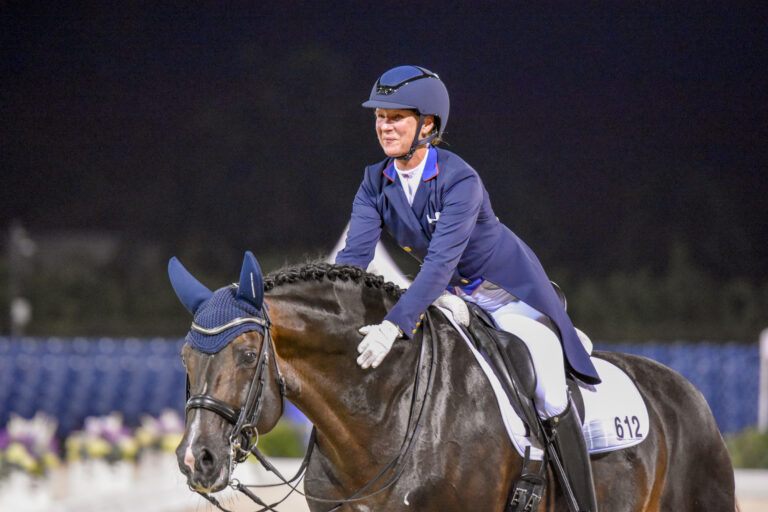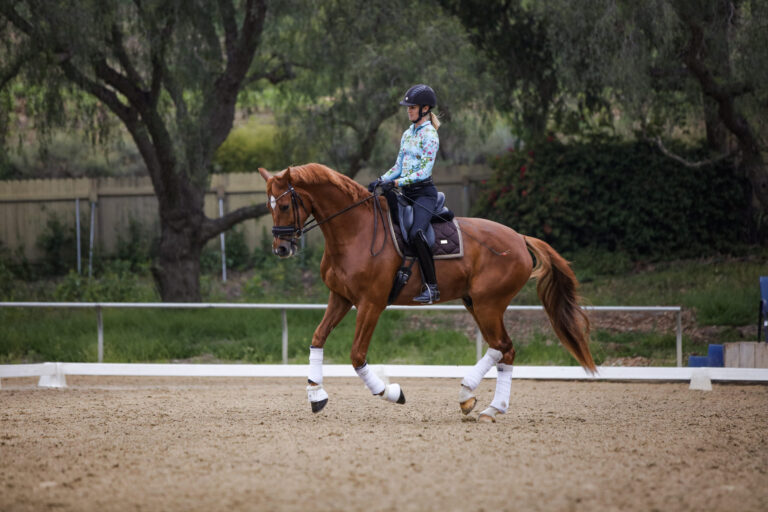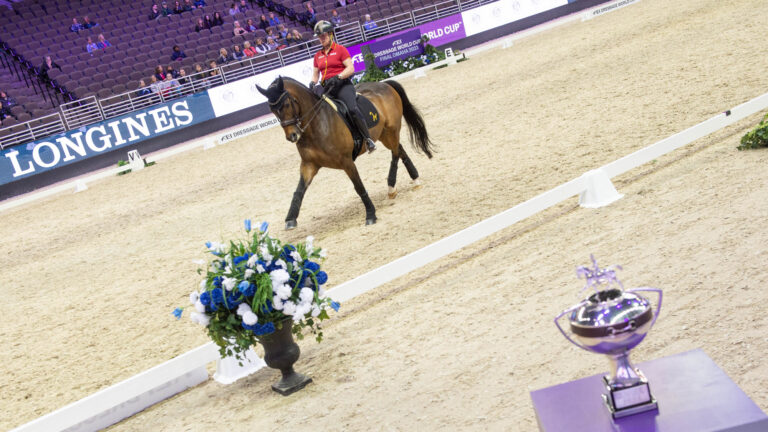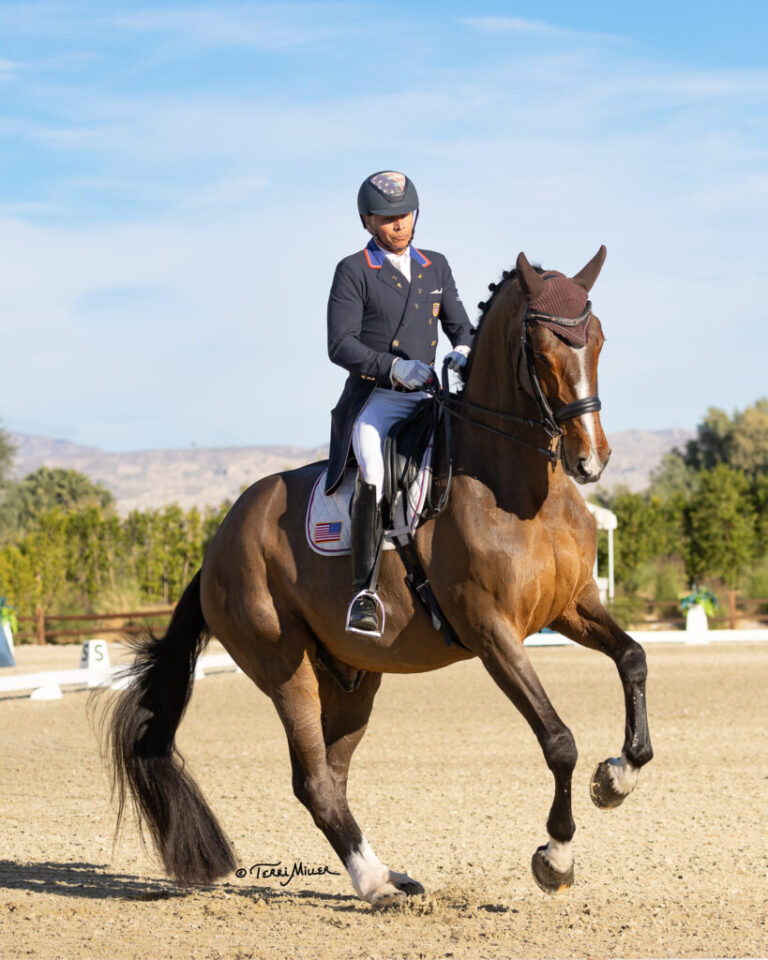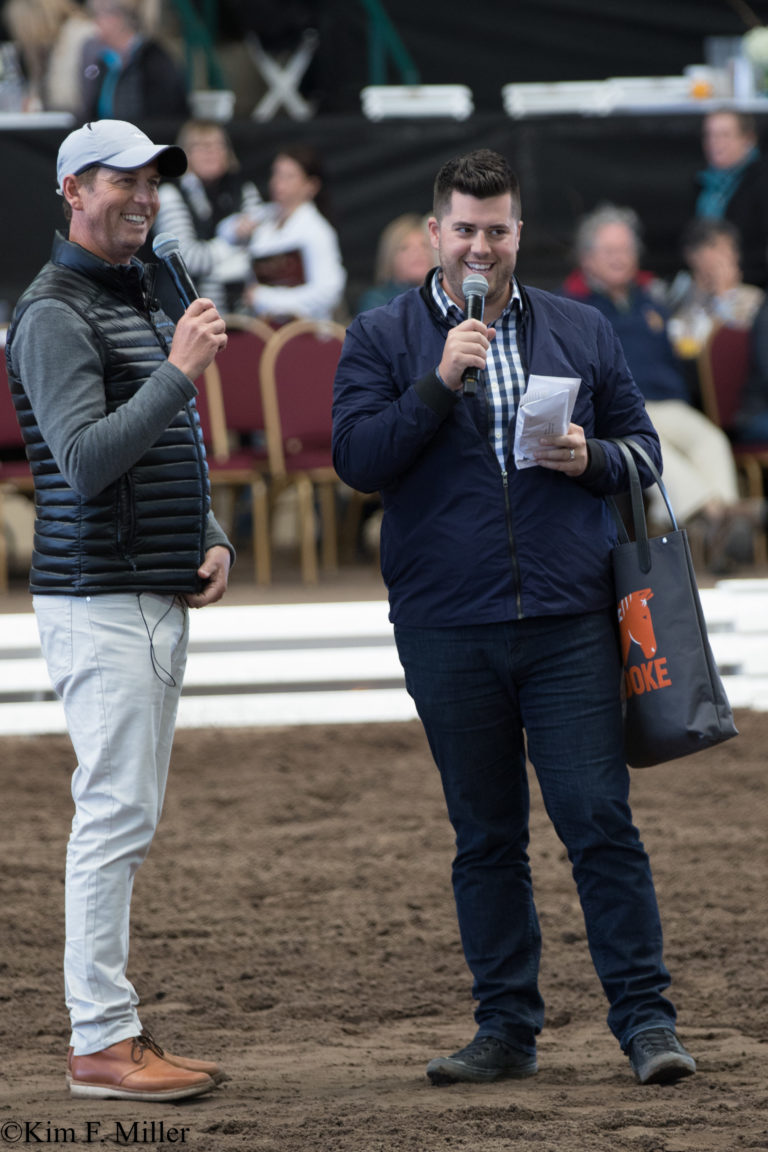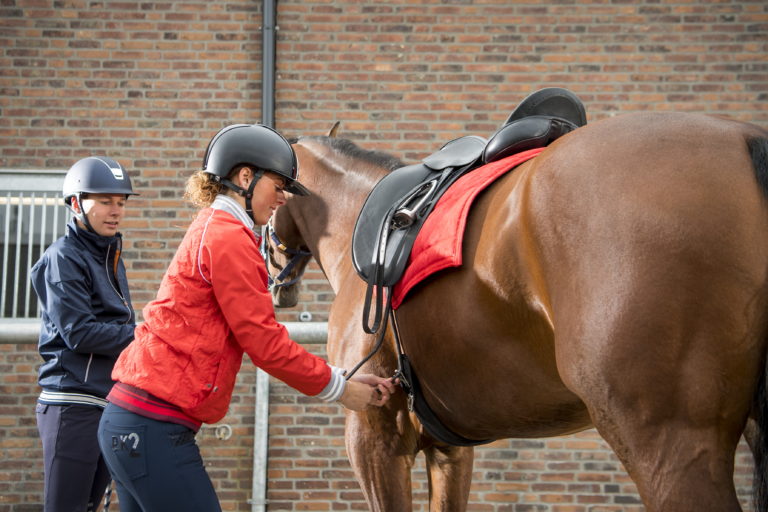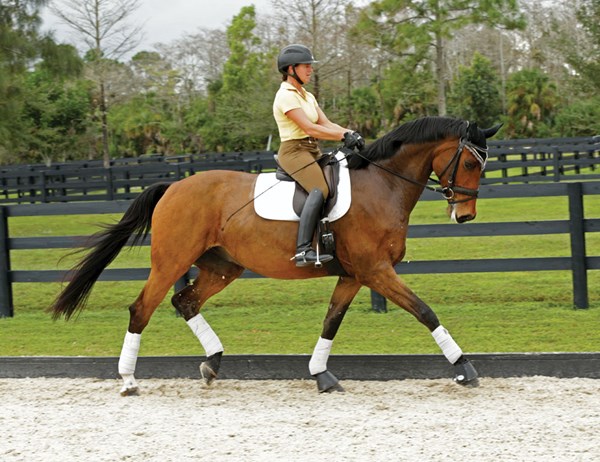Why do some riders seem to progress much more quickly than others? Have you ever felt stuck on the same problem or at the same level for a long period of time?
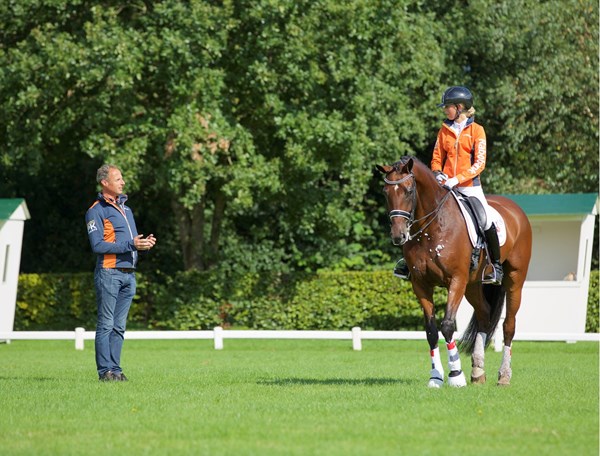
Last January, I wrote an article for Dressage Today titled “Embrace Your Incompetence” about the four stages of learning that everyone goes through to learn any skill: Unconscious Incompetence, Conscious Incompetence, Conscious Competence and Unconscious Competence. Following is a bit about each …
1. Unconscious Incompetence: You don’t know that you don’t know something.
2. Conscious Incompetence: You know what you want to do but you can’t do it yet.
3. Conscious Competence: You can perform the task if you concentrate very hard on it.
4. Unconscious Competence: You can do the thing you want without thinking.
In that article I delved more deeply into the second stage—Conscious Incompetence. This stage is so frustrating for all of us because we know what we would like to do but can’t make it happen yet. This scary, frustrating, annoying stage is where the real learning begins as we gradually make our way into Conscious Competence. This is when it is so important to recognize the responsibility of the student to put himself into a positive, open mindset that is receptive to learning and progressing.
You’ve probably noticed that some people seem to breeze through this Conscious Incompetence stage and on to improvement quickly while others take a long time to make it to the next step in their riding. Why is this? Is it just talent? Is it luck? Is it that some people have the money to buy a fancy horse and some don’t? My opinion is that none of the above is truly important in your ability to progress. What is important are some mental strategies toward learning. And just like any other skill, you can improve these strategies with practice and, consequently, speed up your learning curve. The three strategies introduced here are adopting the beginner’s mind, distinguishing between excuses versus reasons and focusing on reality versus the story.
Adopt a Beginner’s Mind
The first strategy I want to introduce is how to adopt a beginner’s mind. This is a concept from Zen Buddhism, but you don’t have to be Buddhist to utilize it. The idea behind beginner’s mind is that you temporarily set aside all opinions, beliefs, previous experiences, etc. and open yourself up to the exercise/lesson your instructor is trying to teach. This mindset is easier at a lower level, where someone is labeled a “beginner,” but it is just as helpful when a rider considers herself advanced or she has ridden for many, many years. This sounds simple and easy, but it is quite difficult when you have many previous experiences, feelings or opinions rattling around in your mind. I like the image of taking all your preconceived ideas, opinions and beliefs and setting them up on a shelf. At the end of the lesson, I promise they will still be there and you can take them all back down if you choose to do so. When the student allows herself to say, “I don’t know,” she immediately opens herself up to greater learning. Instead, we so often start our sentences, either in our minds or out loud, with “I know, but…. I know, but I’m not good at…. I know, but my horse doesn’t like…. I know, but I need to…. I know, but I always….”
“I know” might be a true statement or it might be 100-percent false. Having an inner dialogue that starts with “I know” keeps us out of the present and living in the past. It doesn’t allow us to experience insights, surprises and discoveries about ourselves and our horses. Beginner’s mind doesn’t ask you to believe in anything in particular, just that you set aside old beliefs for a short period of time while you are in a learning environment—lesson, clinic, auditing, reading, etc. This is often why instructors say they love teaching kids. Kids usually have very few preconceived opinions and beliefs coming into a lesson and they are much more open to saying “I don’t know.” This is probably because they are so constantly in a state of learning, of not knowing—in school, with their parents, as they work on their hobbies. But as adults, do we really know that much more? We have many more experiences than a child, but those may or may not help us to be better riders.
Jen Verharen, business and life coach as well as dressage instructor, sums it up this way, “Curiosity is both the scariest and the most powerful state to be in when you’re learning a new skill. When you find yourself making excuses, ask yourself questions: What do I want to have happen in this situation? What is possible? What do I have control over?”
Distinguish Between Excuses Versus Reasons
Excuses and reasons sound similar on the surface. But an excuse is intended to lessen or eliminate liability, accountability or responsibility. A reason is an explanation given to an event or series of events. The big difference here is accountability. It is a rite of passage to go through the frustrating stage of Conscious Incompetence as you learn a new skill. Let’s say you have become aware that riding a horse round or on the bit is possible, but you are unable to do it. You will have to go through the same feelings of frustration, confusion and lack of coordination that all of us went through at that point. When you are accountable for your learning, you might move through those feelings and into the Conscious Competence stage more quickly. Then you’ll find that you can ride your horse steadily on the bit when you focus hard on all the pieces of the puzzle.
Your instructor will help you break down the pieces of the puzzle—how to have a more balanced and effective seat, how to create enough impulsion from behind to push a horse into the contact, how to bend a horse around your inside leg and connect him to your outside rein, etc. You will begin to get your horse round for moments here and there and then lose it over and over again. When you lose that feeling, it is easy to come up with excuses: The horse’s previous training was no good. I need a different bit. I can’t have an effective seat because of my saddle/my breeches/my boots. My horse is so stiff and resistant. All of these excuses place the responsibility of your struggle to master the concept on someone/something else.
A reason is different from an excuse. When you lose the feeling of having your horse on the bit, an inner dialogue with a reason might go: I let my reins get too long. It’s harder for me to use my left leg/hand than my right. I let the tempo slow down too much. These reasons need not have blame attached to them. They are not negative, they are just honest reasons that can be remedied the next time. Some reasons are much more difficult to remedy: It’s hard for me to sit correctly because of an injury. It’s hard for me to keep my horse pushing because of arthritis in his hocks. But if they are true reasons, then a strategy can be made to work through them.
When you catch yourself making excuses, it’s good to go back to asking yourself what your goal is. This redirects your thinking. Let’s say your horse comes above the bit in the canter depart. Your original thought was My horse refuses to stay round in the canter depart. This is not true. No horse knows he should stay on the bit and then chooses to stick his head in the air for no reason. In fact, he doesn’t know what “on the bit” is in the same way you do. The truth is more likely that you lost your balance and/or lost the connection during the canter depart and he defensively balanced himself by putting his head in the air.
So, what is your goal? Now it should be to ride a smooth, balanced canter depart with your horse round. Now you can break down the steps of that with your instructor. What happens before he sticks his head in the air? Do you lose your position, lose impulsion or lose the connection? Once you figure this out, you can be intentional instead of reactionary. A reactionary rider would say, “Ugh, he did it again. Now I have to get his head back down.” An intentional rider will plan ahead for how to prepare for the next canter depart. If you change your inner dialogue to I must keep my upper body back as I prepare for the canter and push him out on the circle with my inside leg, then you have positive things to do instead of thinking of what your horse does that you don’t like.
“So often, excuses and stories keep us going on a path that directly contradicts where we actually want to go,” says Verharen. “This can be frustrating and mystifying! Articulating and focusing on your desired outcome will help you be strategic rather than defeatist when you’re learning something new.”
If it is so easy to redirect your excuses into positive intentions, why don’t we all just do it? For starters, it’s risky to push through your problems because you might fail or you might come up against a bigger issue. Many times people retreat to what they’ve always done because it is safe, even if they then complain about it. Excuses keep riders from having to try and from facing their fears. When you find yourself having the same problem over and over again, ask yourself: What am I afraid of? Perhaps you are not afraid of anything. But often there is a previous experience that has frightened us or a fear of failure if we try and don’t succeed or a fear of pushing the issue and running into a bigger problem. Voicing this fear out loud to yourself and your instructor will help both of you tackle it. Verharen sums it up this way, “Excuses are disempowering and the result of defeatist thinking. Reasons are empowering, allowing for strategic thinking.”
Focus on Reality Versus Story
We all have stories that we tell ourselves about a situation, and many times we have told the same story for a long time. If we are able to step back and look critically at a situation, sometimes we will find these stories are not true. As riders, we must ask ourselves what is the reality and what is the story? This is similar to excuses versus reasons but can differ in some important ways. If we get stuck telling ourselves the same old story, our learning is impeded.
It might be a fact that you got 64.57 percent on a First Level test last year, but ultimately it is a story because those marks are a subjective opinion of one person—the dressage judge. We can use her opinion to help us to a point, but it does not represent a true reality unless we can repeat it over and over. This is one of the frustrating aspects of our sport.
A story often slows down a rider’s progress when she has been together with a horse for a long time. If a rider started with a horse when he was very green, it’s easy to say, “He always struggles with the left-lead canter depart and he has since he was 4 years old.” This may have been true once upon a time (when he was 4) but to continue repeating that story now that the horse is 7 does not serve either of you in your progression. These riders end up riding the past rather than the present and inadvertently perpetuate a behavior they say they wish to change.
Another place where story can be very detrimental to progress is when assumptions are made that keep a rider from going outside the comfort zone. For instance, you may think the other competitors in the warm up believe you are not good enough, and this thought will keep you from competing. But the reality is that you do not actually know what other people are thinking and their thoughts do not affect your horse. Another example is believing that your instructor is going to be insulted if you ride with a clinician who is coming to town next month. This story could keep you from experiencing a great learning opportunity. You do not know how your instructor feels about the situation unless you ask, and a worthwhile instructor will never discourage you from a good learning opportunity. These examples have a fear component that needs to be addressed because it keeps the rider from seeing the reality of the situation and, therefore, prevents progress.
Identifying reality versus story can help a rider to embrace the concept of beginner’s mind. Let’s say you realize it’s a story you’re telling yourself about a bad right-lead canter depart. Just recognizing that it is a story and not reality can change your thinking enough to open you up to trying something different in today’s lesson with your instructor.
Your instructor has a big responsibility to teach you to the best of his ability. But we, as students, have an even bigger responsibility to be good students. When you think of any great rider, you can probably bet that she is an exceptional student. Great riders open themselves to any and every learning opportunity. They don’t make excuses but instead identify the reasons they can’t do something and slowly work to correct that. And they constantly remind themselves of the reality of the situation rather than tell a story in their heads. All of these techniques keep them gradually but steadily progressing. If you feel stuck in some way, try working with one or all of these concepts and see if you can improve your learning curve by starting with your mental state. Your horse will thank you and he or she can be your best teacher for this. Horses live in the present moment and they don’t lie to themselves. If we can work to be more like them, we can understand them better and improve our communication with them.


